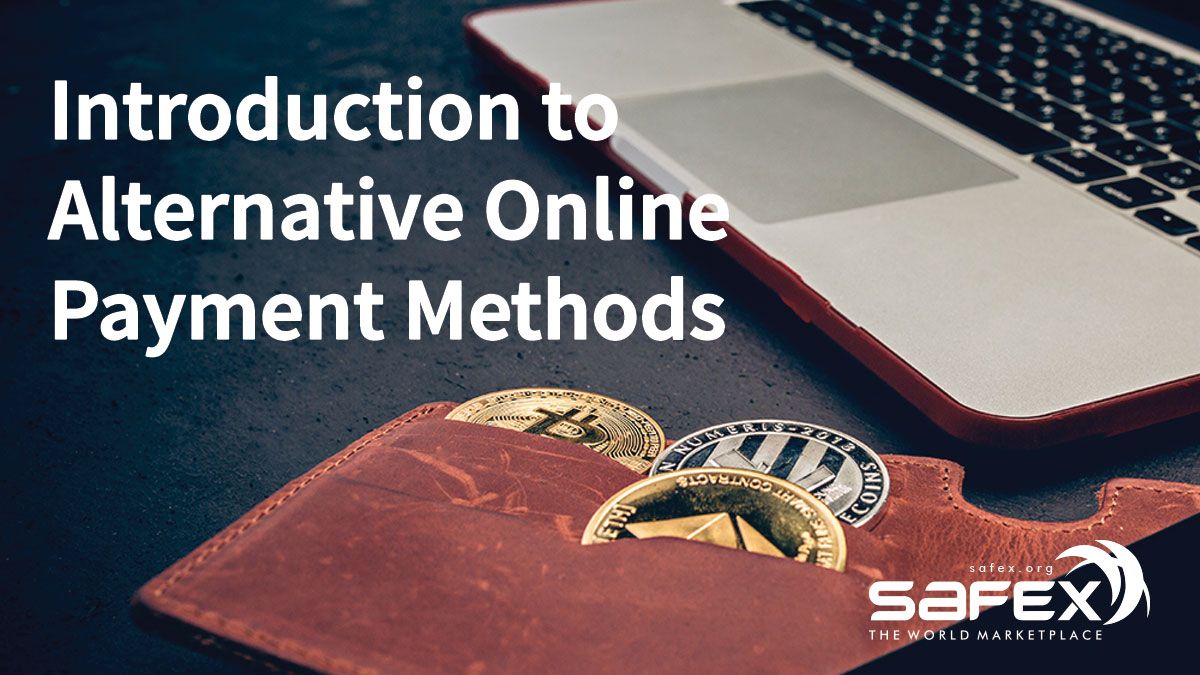Introduction to Alternative Online Payment Methods
Although the use of credit cards is still the dominant way to settle transactions online, there are more and more alternative payment methods emerging. While such payment methods were introduced by established eCommerce giants, cryptocurrency is a new alternative allowing true peer-to-peer trade.

The term alternative payment method is used to describe any type of payment that does not involve a credit card or cash. In the past few years, the digital transformation has directed the growth of the eCommerce way of trade that continuously records a significant increase and has been leading to an ongoing development of more beneficial trade conditions. This search strives to overcome the traditional payment methods with their high operating fees, leading to the integration of alternative online payment methods.
With time, the meaning of alternative payment methods has expanded and now encompasses all the methods of online payments that aren't done by major credit card distributors such as Visa, MasterCard or American Express. Continuing to diversify, the alternative payment methods enable online shoppers to use different payment options that are trustworthy, instant and more favorable for both parties.
Although eCommerce stores still must enable traditional online payment methods as its the most adopted technology, it's becoming more and more important to support their customers with preferable payment options since payments have become a significant part of the overall purchase experience. Besides the mentioned alternative payment methods, eCommerce stores should inevitably consider allowing online shopping with cryptocurrency making the online shopping experience of users even better.
Traditional banking system for online payments
The complex card payment system consists of several interacted intermediaries that manage the process, add their fees and affect the final cost of a transaction and product price.
Imagine you want to buy a cup online. After you choose it, type in the credit card information and click "buy", you receive the confirmation of the purchase and your cup should be on the way to you. Behind the scenes, the payment process scheme looks like this:
The payment gateway processes the provided personal data and card numbers, transaction details and passes it further to the card association that passes that information to the issuing bank (your bank).
The issuing bank checks if this transaction is possible, if you can afford it, and passes the authorization note to the payment processor.
The payment processor sends the information back to the payment gateway, which processes it further to the acquiring bank (bank of eCommerce store), informing the eCommerce store about the confirmed payment.
Providers of alternative payment methods
PayPal
PayPal, which was founded in 1998, is the first alternative payment method provider that introduced internet-payment options. It counts nearly 280 million users all over the globe, providing different payment options such as PayPal, PayPal Credit, Venmo - only available for users located in the US - UnionPay which is the main provider of credit and debit cards for customers in China and PayPal Checkout that introduced an option to turn a website into an online store.
The shoppers are given the possibility of maintaining the balance in their account and pay directly from it. In contrast to traditional bank transactions, PayPal transfers the payment instantly and it can be spent right away. The users can also withdraw their funds from other sources such as credit card or bank account, and they can use the PayPal credit options that enable them to pay the specific amount in six months. In case that the cost of shopping can not be covered by the PayPal balance, the amount will be automatically withdrawn from another funding source. Since PayPal is linked to the user's bank account, there is no fear that the payment won't be properly executed.
With PayPal, there can be created a business account that enables the merchant to receive the payments - eBay Sales was the first one to use this possibility. Users prefer the PayPal payment method because they are not obliged to give any credit card information when making purchases, making them feel more secure especially when doing purchases on an eCommerce website they are not familiar with.
Apple Pay
Since the eCommerce growth is supported by the use of mobile devices that generate over half of today's online shopping revenues, Apple introduced Apple Pay - a secure payment method provided for iOS devices - for its users.
Apple Pay provides the possibility of cardless payment, is introducing biometrics payments, and announcing the participation in the neo-banking industry with its own credit card. All payment transactions are executed through secure tokenization that doesn't transfer any personal data to third-party eCommerce store. Apple Pay also supports the contactless purchases that can be made by Face or Touch ID, while the payment transactions can be instructed through messages or by interacting with Siri.
Apple Pay insists on users' security and stores the payment information in the cloud, so even in the case the device is stolen, there is no way that any of the provided information will be compromised or get lost.
Amazon Pay
With a simple integration process on an eCommerce website, Amazon Pay enables the users to finish their shopping easier and more quickly, using their Amazon credentials and information they have already registered within the creation of an Amazon account. Choosing to pay with Amazon Pay means that the users will not be obliged to give any of their personal information to a specific eCommerce store. Amazon Pay will transfer all the necessary data to it such as credit card, debit card or bank account number, without providing the full numbers.
Amazon is definitely one of the current leaders in online shopping, counting tens of millions of users. Connecting an eCommerce store to Amazon Pay can only simplify the user experience of payment methods and enhance brand trust.
The innovation of cryptocurrencies
Cryptocurrencies are the newest and most innovative form of payment which enables users to conduct peer-to-peer trade on a whole new level. The mutual feature of cryptocurrencies is that there is no centralized third-party involved in the settlement of transactions. However, cryptocurrencies majorly differ in their features for use and their consensus algorithm which decides in which way transactions are settled and included into the blockchain by the network participants.
Bitcoin being the first developed cryptocurrency was also first one to be accepted as a legitimate form of payment which opened the way for integration of other cryptocurrencies in eCommerce. Bitcoin can be described to be designed majorly as store of value and also medium of exchange for medium to high value transactions. Other cryptocurrencies have added additional features into their code which can bring different kind of applications to their users.
Especially for people who avoid doing transactions with a credit card because of privacy-related reasons, the use of Bitcoin and other cryptocurrencies as a form of payment can be interesting. Bitcoin is based on a public ledger which means that transactions are pseudonymous but completely traceable by everyone. In contract to this, there are cryptocurrencies that use an obfuscated ledger technology which makes transactions on their network anonymous. Due to these unique features and applications, it is predictable that the next stage of eCommerce will see an increasing use of this technology.
Overcoming the chain of intermediaries, blockchain technology can offer lower transaction fees compared to traditional payment gateways and support true peer-to-peer trade. Transactions on a blockchain can be executed almost immediately - depending on the type of blockchain and transaction traffic - which means that merchants can use their assets right away after purchases have been done and trade them further for other cryptocurrencies or exchange them for a fiat currency.
A fully decentralized eCommerce platform based on blockchain technology has been developed by Safex, introducing Safex World Marketplace app where the merchants can generate accounts and online stores, and offer their products all over the globe without any limitations. All transactions on the network are made with a cryptocurrency which is designed to primarily serve as a medium of exchange and incentivizes adoption along the way, without the interference of third-party protocols or systems. It is based on an obfuscated ledger technology which makes all transactions on the network to be anonymous. This is important for users who want the keep the privacy of their balances and transaction histories. Compared to other eCommerce giant platforms such as Amazon, Alibaba, or eBay that charge fees up to 40%, with the Safex eCommerce platform the merchants will benefit by having only a 5% fee on sales. As Safex strongly emphasizes, with the launch of The World Marketplace platform, a new era of true peer-to-peer eCommerce - from the hosting of an offer to the settlement of a purchase - has begun.
Read more about eCommerce on our blog.
